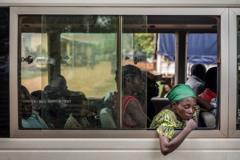In a startling development, the U.S. refugee program has taken a controversial turn as President Donald Trump recently prioritized the resettlement of Afrikaners—white South Africans claiming persecution—while leaving countless other refugees in dire circumstances, including families fleeing conflict from countries such as the Democratic Republic of Congo (DRC) and Gaza.
A particularly poignant case is that of Pacito, a DRC refugee who, along with his wife and infant son, found himself sleeping in a Kenyan car park after his long-anticipated flight to the U.S. was abruptly canceled just before departure due to the suspension of the U.S. refugee program. Pacito, who sold most of their belongings in preparation for a new life, describes the feeling of abandonment as deeply unfair. “There are 120,000 refugees who went through the whole process... but now these (Afrikaners) are just processed in like three months,” he expressed.
Under Trump’s directive, the administration has implemented stringent restrictions on immigration pathways while controversially allowing a select number of Afrikaners, who have arrived amid claims that they face “racial persecution” in South Africa, to bypass standard refugee protocols. This has led to significant criticism from refugee advocacy groups, who argue that equal treatment under the law is crucial, especially for those facing genuine threats.
The refugee crisis has further evolved as the White House's handling of Afrikaner refugees comes amid accusations of “genocide” against them, claims that have been widely dismissed by South African authorities yet have gained traction among right-wing factions in the U.S. The situation has created a rift in U.S.-South Africa relations, particularly after the Trump administration threatened to withdraw foreign aid due to land reform policies in South Africa.
Alongside Pacito, other refugees, such as the Hammad family from Gaza, are left questioning why their plight seems overlooked compared to that of Afrikaners. Having applied for the U.S. green card lottery in 2024 only to be denied, Amjad Hammad lamented, “What are the Palestinians facing, if the people in South Africa are facing a genocide?” This sentiment is echoed widely as violence escalates in Gaza, with over 53,000 people reportedly killed since early October 2023.
As the U.S. loses focus on long-standing humanitarian commitments, families like Pacito's remain trapped in uncertainty, struggling to meet their basic needs while facing the haunting prospect of returning to dangerous homelands. “I can’t go back,” said Pacito, reflecting the desperation of countless refugees yearning for safety and dignity in a world increasingly defined by exclusion.



















